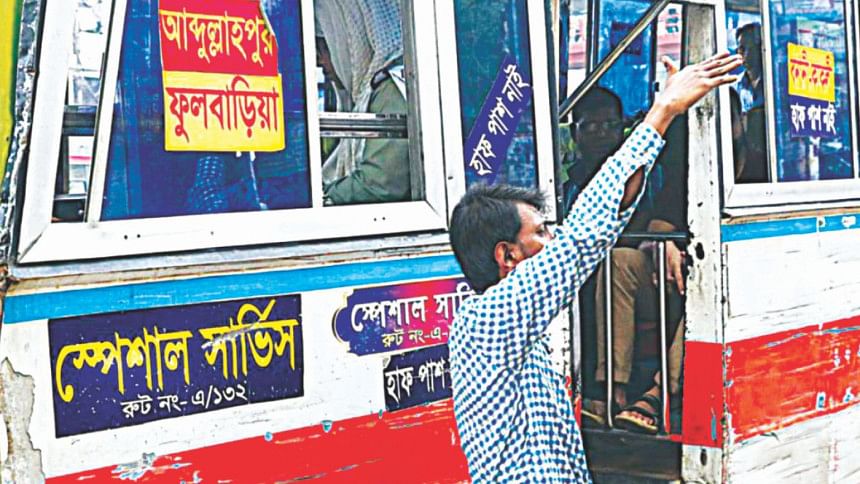Bringing discipline in road transport sector

There was a timely piece on bus fare published in The Daily Star on 12 March 2017 titled, “Bus fare not fair”. The piece rightly illustrated sufferings of the passengers who have to rely on buses for regular commuting. As it appeared in the report, owners of the buses not only charge extra, but violate rule by employing children and young people as conductors.
Passengers are forced to pay extra fare in the name of so-called, “sitting service”. To collect the extra fare, bus owners ignore the specified fare and follow their self-devised system. Due to their political affiliation, owners tend to ignore directives made by Bangladesh Road Transport Authority (BRTA) officials. Branding their services as “sitting-service”, “gate-lock”, “non-stop”, “time-controlled”, “speedy service” and “counter service”, operators charge high fare and those buses stop almost everywhere if their drivers deem it fit. Conductors are employed to collect fare set by owners.
Recently on 27 March 2017, the cabinet has approved in principle the draft of the Road Transport Act. According to this law, one needs to pass eighth grade to be a driver and fifth grade for being his assistant. A conductor has to have good manners and be at least 18 years old to get the licence. Sections 13, 14 and 15 of the Act deal with licencing provisions. Literacy and numeracy have been referred as qualifying condition to get licence for a conductor in the proposed Act as well.
In reality, however, children are not only employed as conductors but they too drive vehicles on some routes. A report published in one of the Bangla dailies (Prothom Alo, 12 December 2016) revealed that a significant percentage (35%) of drivers plying human haulers, locally known as Leguna are children between 13 and 18. These children are plying vehicles in 15 routes without valid driving license and some under-age drivers got severely injured in road accidents. In absence of adequate provisions of education and training, children from disadvantaged communities are engaging in hazardous forms of labours in huge numbers.
Though many children drop out of the formal education system and get engaged with different forms of labour, Article 17 of the Constitution guarantees free and compulsory education for all. Although there is a requirement to have literacy skill in order to acquire licence of conductor in the proposed Road Transport Act, opportunities to gain literacy and numeracy skills are limited for those down-trodden children.
The much-talked Road Transport Act, preparation for which went on for six years, will now be submitted to the Parliament as the cabinet has approved it. An outdated piece of legislation called the Motor Vehicles Act of 1939, was in operation until 1983 when the Motor Vehicles Ordinance was promulgated replacing the old Act of 1939. Since 2010 the government has been trying to upgrade the law as the existing legal framework is not able to bring discipline to the road transport sector. With the enactment of new law, we expect that positive changes will come in this sector for public interest.
The writer is a human rights worker.

 For all latest news, follow The Daily Star's Google News channel.
For all latest news, follow The Daily Star's Google News channel. 



Comments